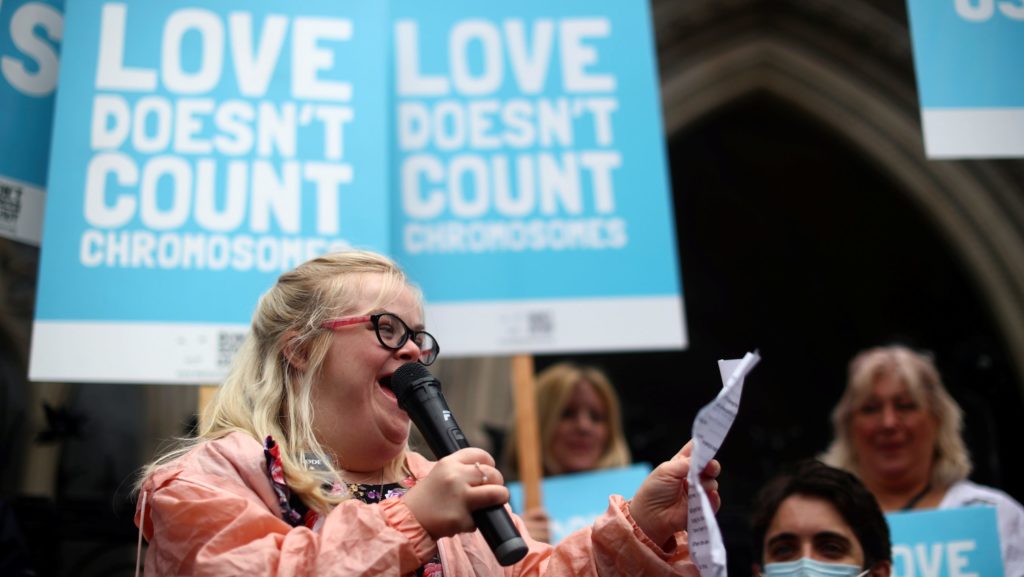Scotland has seen a dramatic rise in abortions involving Down syndrome diagnoses, with government figures showing an 82% increase since 2021.
A total of 60 fetuses with Down syndrome were aborted in 2024 -- almost double the number of the 33 such abortions in 2021.
The increase also represents a 15% rise over the 52 abortions of Down syndrome-affected unborn babies in 2023, according to statistics released by Public Health Scotland.
Lynn Murray of the Don't Screen Us Out advocacy group said the increase was largely a result of the rollout of non-invasive prenatal tests, known as NIPT, which has made the detection of Down syndrome comparatively easy.
Murray, of Edinburgh, Scotland, is the mother of a 25-year-old daughter who has Down syndrome. "I see every day the unique value she brings to our family and the positive impact she has on others around her," she said in a statement.
"It is deeply concerning that despite the leaps that advocacy groups have made in raising awareness in support of people with Down's syndrome, abortion in the case of Down's syndrome is still so commonplace and widespread in the UK," she said in a May 27 statement published on the Don't Screen Us Out website.
"In fact, we hear from parents all the time how abortion was repeatedly presented to them in the hospital as an obvious solution following the receipt of the news that their baby had Down's syndrome," she said.
"We are calling on the Government to undertake an urgent inquiry to review the impact that Non-Invasive Prenatal Tests are having on the number of babies that are screened out by termination due to Down's syndrome in Scotland each year," she continued.
"They then need to urgently introduce medical reforms to our screening program to ensure that this deeply disturbing increase in the number of abortions for disability is reversed."
Murray added: "We are calling on the Scottish Government to urgently update Scottish abortion legislation to ensure that babies with Down's syndrome cannot be aborted right up to birth, as is permitted under current legislation."
The statistics also revealed that there were 280 abortions performed in 2024 on grounds of disability, a 26% increase from 2021 when 222 abortions were carried out for the same reason.
Under the 1967 Abortion Act, it is normally illegal to carry out abortions after the 24th week of pregnancy. Disability, including Down syndrome, is among the few reasons for which abortions up to birth are permitted.
Since 2021, Heidi Crowter, a 29-year-old English woman with Down syndrome, has challenged the law through the British courts on the grounds that it is discriminatory, but she lost her case at both the High Court and the Court of Appeal.
The new statistics also show that the number of abortions carried out in Scotland in 2024 was the highest number on record.
There was an increase of 468 abortions in the previous year, with numbers soaring from 18,242 in 2024 to 18,710, meaning the abortion rate per 1,000 women ages 15 to 44 has increased from 17.5 in 2023 to 17.9 in 2024.
In 2024, Scotland also introduced 650-foot (200-meter) exclusion, or "buffer", zones around abortion clinics through the Abortion Services (Safe Access Zones) Scotland Act.
The law makes it illegal to influence anyone about a decision to access abortion, including offers of help to women within a buffer zone or by silent prayer. Anyone who commits an offense can be fined up to 10,000 pounds or $13,500.
In February, Rose Docherty, 74, became the first person to be arrested for violating a buffer zone when holding up a sign outside of an abortion facility at the Queen Elizabeth University Hospital in Glasgow which said: "Coercion is a crime, here to talk, only if you want."
She later rejected a formal warning from the Crown Office that she could face prosecution and said she would rather go to jail rather than surrender her right to freedom of speech.

